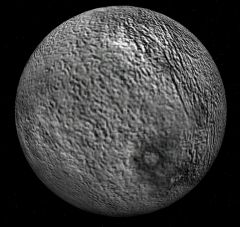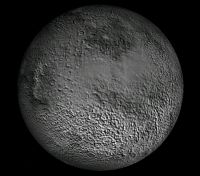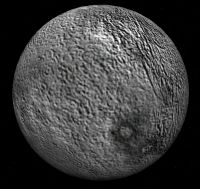2 Pallas
| 2 Pallas | |
|---|---|

| |
| 2 Pallas in Orbiter 2002P3 from MainBeltAsteroids051403.zip | |
| Designation | |
| Name | 2 Pallas |
| Reference body | Sun |
| Planetary mean orbits | |
| Epoch | 2006 |
| Semimajor axis (a) | 414 757 546 129.269 m |
| Eccentricity (e) | 0.230611514238091 |
| Inclination (i) | 34.84070464° (0.608085009743882 radian) |
| Longitude of the ascending node (LAN, ☊) | 173.1491513° (3.02202278733198 radian) |
| Longitude of periapsis (ϖ) | 483.5840505° (8.44013389082127 radian) |
| Mean longitude (L) | 584.0800658° (10.1941202442395 radian) |
| Selected physical parameters | |
| Mean radius | 267000 km |
| Mass | 2.06×1020 kg |
| Rotation elements | |
| SidRotPeriod | 28127.52 seconds (7.8132 hours) |
| SidRotOffset | 0 |
| Obliqutiy | 0 |
| LAN | 0 |
| Note | *Elements given are from 2 Pallas.cfg (AsteroidPack_v1.00.zip) |
2 Pallas was discovered on 28 March 1802 by Heinrich Wilhelm Obers, and was at first classified as a planet, at least until it was realized that there are many small bodies in the area between Mars and Jupiter, at which time they were reclassified as asteroids,
2 Pallas in Orbiter[edit]
2 Pallas was first introduced with the release of MainBeltAsteroids051403.zip in May 2003. Note that the landing surface as given in the config file is spherical, but the visual of Pallas is not, if you land, you will likely be above or below the visual surface.
| Add-on | Source | Version | Author | Type | Release Date | Compatibility | Wiki article |
|---|---|---|---|---|---|---|---|
| Celestial Bodies Motion - Part 2/4 - v2.0.0 | O-F Resources | v2.0.0 | cristiapi | Scenery | 2 July 2015 | *Module only | |
| Asteroid Pack 1.00 | O-F Resources | 2004-11-21 | Nighthawke | Scenery | 21 November 2004 | ||
| Main Belt Asteroids v1.0 | O-F Resources | v1.0 | Unknown OHM Addon Developer | Scenery | 14 May 2003 | ||
See also[edit]
Gallery[edit]
Northern and southern hemispheres of Pallas from the Very Large Telescope in 2020
| edit The Solar System | |
|---|---|
| Central star |
Sun (Sol) |
| Planets |
Mercury - Venus - Earth - Mars - Jupiter - Saturn - Uranus - Neptune |
| Natural satellites |
Moon - Phobos - Deimos - Io - Europa - Ganymede - Titan - more... |
| Add-ons |
Planets - Dwarf Planets - Small objects - Natural satellites - Alternative star systems |


